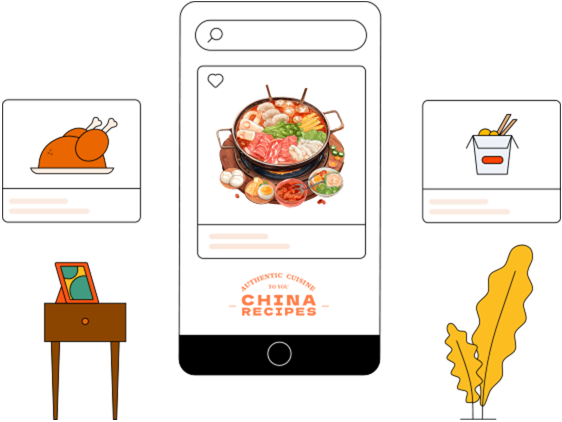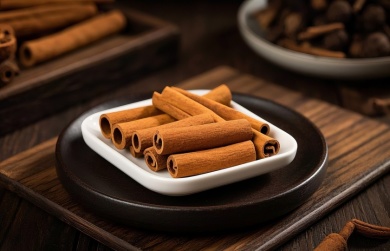Explore the Versatile Uses of Cinnamon in Cooking and Its Benefits
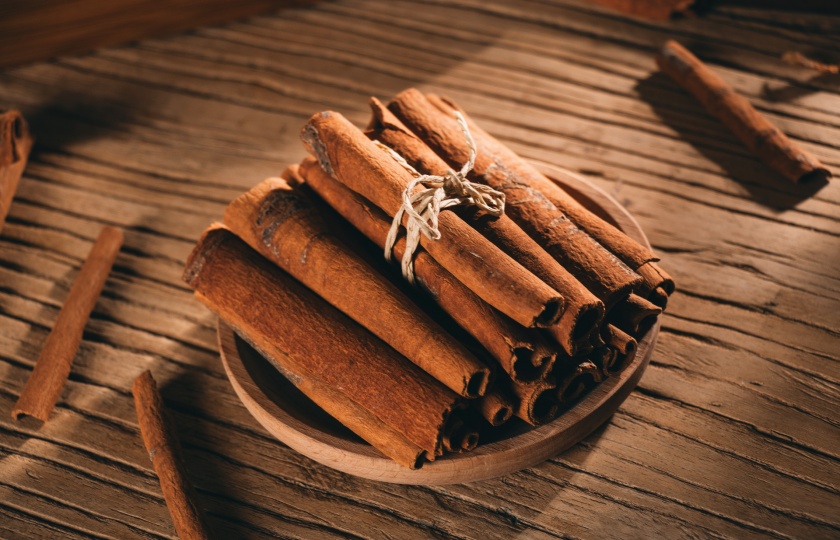
Cinnamon is frequently used in Chinese cooking, adding unique flavors to dishes. Today, we’ll explore the various ways cinnamon is used in cooking, so you can learn more about this versatile spice!
What is cinnamon good for in cooking?
As a magical spice, cinnamon is not only common in savory dishes, stews, and baking, but it also plays an important role in desserts, enhancing their flavor. Here are some of the roles cinnamon plays in different types of cooking:
1. Balancing the Flavor of Dishes
Did you know cinnamon has a special magic in dishes? Adding it to stews like lamb or beef helps neutralize any gamey taste while enhancing the dish with a mild, unique aroma, boosting the overall flavor. Cinnamon is especially essential in many Chinese stews.
2. Enhancing Fragrance
In desserts, a small amount of cinnamon can help intensify the aroma. Apple pie, cinnamon rolls, and hot chocolate are perfect examples of dishes that benefit from a touch of cinnamon. The combination of its spicy and sweet fragrance adds depth to the food.
3. Pairing with Coffee and Tea
Cinnamon can also be paired with coffee and tea to create unique beverages. Adding a small cinnamon stick to coffee infuses it with a rich, aromatic fragrance in every sip. In winter, drinks like mulled wine or hot apple cider benefit from a cinnamon stick, enhancing the warmth. Personally, I love a cup of cinnamon hot chocolate in the winter — it’s so comforting!
4. As an Ingredient in Marinades and Sauces
Cinnamon is often included in marinades and sauces. Its scent and flavor naturally infuse the ingredients, enriching their taste. For example, when marinating chicken, pork, or beef, adding a bit of cinnamon powder makes the meat more flavorful. Additionally, adding cinnamon powder to barbecue sauce, curry sauce, or braising sauces can bring a warm, aromatic touch to the sauce.
5. Health Benefits in Traditional Chinese Medicine
In traditional Chinese medicinal food therapy, cinnamon is believed to have warming properties that dispel cold and promote circulation. It’s commonly added to nourishing soups or remedies to boost Yang energy, warm the body, and improve blood flow. In winter, drinks like cinnamon red date tea or cinnamon ginger tea are traditional health tonics.
6. Enhancing the Aroma of Baked Goods
Many baking enthusiasts add cinnamon powder to cookies, cakes, and muffins to enrich them with a fragrant aroma. Personally, when making muffins, I always add a bit of cinnamon powder. It not only gives the muffins a sweet fragrance but also a warm, spicy undertone, making them more complex in flavor.
How to use cinnamon in cooking?
In Savory Dishes
Beef Stew: When making beef stew, add a small cinnamon stick to help remove any gamey smell and enhance the flavor, making the beef tender and juicy.
Curry Chicken: Add a pinch of cinnamon powder to curry chicken to elevate the fragrance and enrich the flavor of the curry.
Roast Lamb: When marinating lamb, add a little cinnamon powder along with rosemary and olive oil for a delicious aroma and taste.
Braised Pork: A small cinnamon stick in braised pork adds depth to the fragrance and helps balance the richness of the meat.
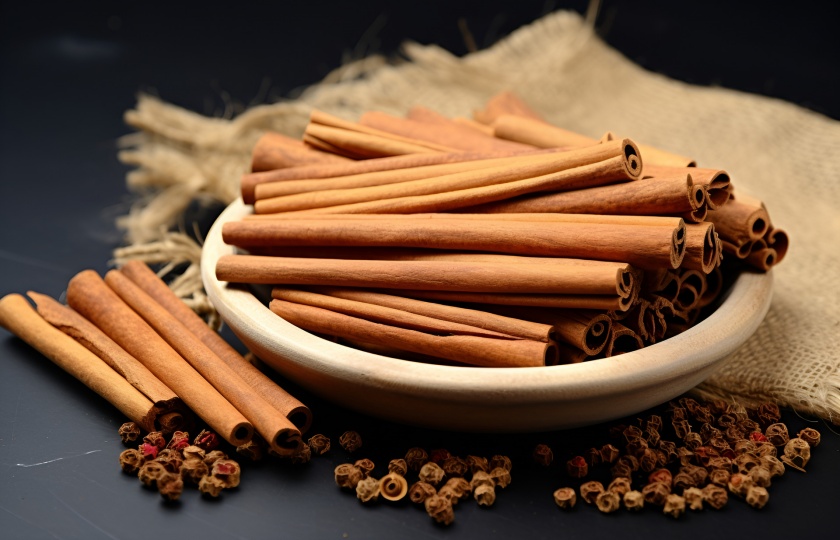
In Desserts
Apple Pie: Add cinnamon powder to the apple filling and sprinkle a little sugar on top for an apple pie that smells heavenly and isn’t overly sweet.
Cinnamon Rolls: Mix cinnamon powder into the dough, along with sugar and butter. When baked, these rolls come out crispy on the outside and tender on the inside with an irresistible fragrance.
Hot Chocolate: Add a cinnamon stick to hot chocolate and let it simmer for a few minutes to infuse the warm, spicy aroma into the drink — perfect for cozy winter nights.
Roasted Pumpkin: Sprinkle cinnamon powder on roasted pumpkin and drizzle with honey. The result is a sweet and aromatic dish.
In Beverages
Coffee: Add a small cinnamon stick to your coffee, and after brewing, it will infuse the drink with a lovely warmth.
Tea: Add a cinnamon stick to black or green tea for an enhanced fragrance and a deeper, richer taste.
Mulled Wine: Add a cinnamon stick to hot red wine with some orange and lemon slices. The result is a fragrant and warming drink, perfect for winter.
In Marinades and Sauces
Meat Marinades: Add a pinch of cinnamon powder to your meat marinades along with salt, black pepper, and olive oil for a flavorful result.
Barbecue Sauce: A bit of cinnamon powder in your barbecue sauce will deepen the flavor and enhance the aroma of grilled foods.
Curry Sauce: A small amount of cinnamon powder in your curry sauce will boost the fragrance, making it richer and more complex.
In Traditional Medicinal Foods
Cinnamon Red Date Tea: Simmer cinnamon sticks with red dates for a warming and aromatic drink, perfect for winter.
Cinnamon Ginger Tea: Boil cinnamon sticks with fresh ginger and a little brown sugar for a soothing, warming drink ideal for cold weather.
Precautions
Use in Moderation: Cinnamon has a strong fragrance, so be careful with the amount. 2-4 grams per kilogram of ingredients is usually enough.
Choose the Right Type of Cinnamon: There are different types of cinnamon, like Ceylon and Chinese cinnamon. Ceylon cinnamon has a milder fragrance, ideal for desserts, while Chinese cinnamon has a stronger flavor, making it perfect for savory dishes.
What flavor does cinnamon add to food?
Cinnamon can impart several distinct flavors to dishes:
Sweet Aroma: Cinnamon naturally brings a rich, warm sweetness with a woody fragrance that’s incredibly comforting. Think of a classic cinnamon apple pie, where the sweet warmth of cinnamon blends with the fruity aroma of apples.
Spicy Flavor: Cinnamon also has a subtle spiciness that enhances dishes without overwhelming the palate. When used in stews or roasted meats, it adds complexity to the meat’s flavor, making it richer and more layered.
Rich, Full Flavor: Cinnamon can lend a depth to food, making dishes fuller and more satisfying. In desserts like cakes and puddings, adding cinnamon powder can balance out sweetness with a spicy, aromatic note, creating a more rounded flavor profile.
Exotic Flavor: With its unique fragrance, cinnamon can infuse food with an exotic flair. Whether it’s in Middle Eastern spiced stews or European cinnamon bread, it brings a touch of culture to your meal.
What can I cook with cinnamon?
As mentioned, cinnamon can be used in a variety of dishes, from desserts and drinks to meats and vegetables. Here’s a simple recipe I often make:
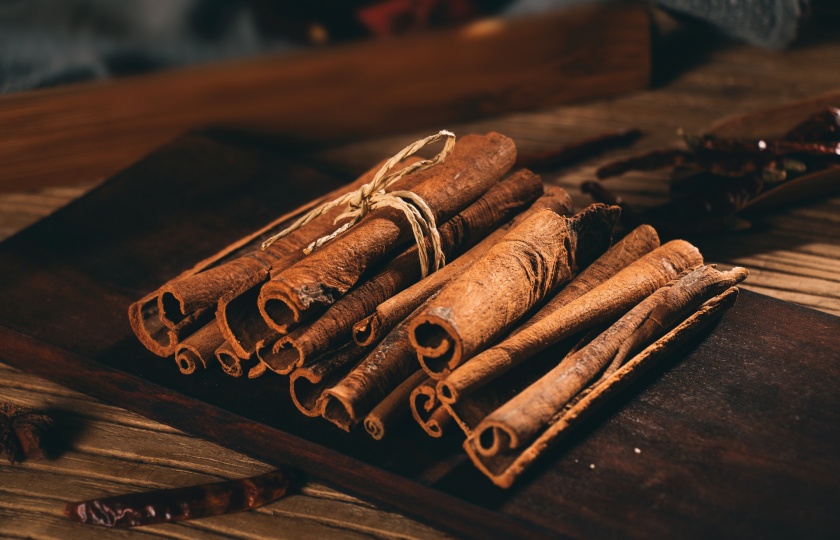
Cinnamon Roasted Chicken Legs:
Score the chicken legs and marinate them with soy sauce, rice wine, oyster sauce, garlic, cinnamon powder, and black pepper for 2-3 hours.
Roast in the oven at 200°C (400°F) for 30-40 minutes, flipping halfway through.
The result is crispy, golden skin and juicy, tender meat, with cinnamon’s fragrance infused throughout, turning a simple roasted chicken leg into something extraordinary.
What food is good with cinnamon?
Many foods pair wonderfully with cinnamon. Here are some examples:
Desserts & Drinks
Apples: Cinnamon and apples are a classic combination. Sprinkle cinnamon on apple slices or add it to apple pies for a perfect autumn flavor.
Coffee: Adding cinnamon to coffee reduces its bitterness and adds a fragrant note.
Pumpkin: Cinnamon enhances the sweetness of pumpkin, making it perfect for pies, soups, or roasted dishes.
Cheese: Mixing cinnamon with cheese creates a sweet yet savory flavor, a key ingredient in many cakes and desserts.
Oatmeal: Adding cinnamon to oatmeal adds warmth and aroma, making it even more comforting.
Savory Dishes
Beef: Adding a cinnamon stick to beef stew removes any gamey smells and makes the beef more tender.
Lamb: Cinnamon enhances the aroma of lamb dishes, especially in braised lamb.
Chicken: A pinch of cinnamon powder in curry chicken elevates the fragrance and deepens the flavor.
Health & Medicinal Foods
Red Dates: Cinnamon and red dates together make a sweet and fragrant tea, perfect for winter.
Dong Quai: Combining cinnamon with Dong Quai helps invigorate the blood and is particularly beneficial for women’s health.
Astragalus: Cinnamon paired with Astragalus promotes heart health and boosts energy.
What are the benefits of adding cinnamon to your food?
Antioxidant and Anti-inflammatory
Cinnamon is rich in antioxidants, such as polyphenolic compounds, which help eliminate free radicals in the body and reduce oxidative damage. At the same time, cinnamon has anti-inflammatory properties that can help reduce chronic inflammation. This can provide relief for issues like arthritis, slow-healing wounds, and muscle or joint pain.

Blood Sugar Control
Cinnamon helps regulate blood sugar levels, making it especially beneficial for people with diabetes. It can increase insulin sensitivity and promote better glucose utilization, thereby lowering blood sugar levels. Studies show that drinking cinnamon tea or consuming cinnamon in moderation after meals can help control blood sugar.
Cardiovascular Health
Cinnamon can lower cholesterol and triglyceride levels while stabilizing blood pressure, which helps prevent heart disease and stroke. It can also improve blood circulation and reduce the risk of atherosclerosis.
Improved Digestion
Cinnamon stimulates gut motility and enhances digestive function, which can relieve discomfort such as bloating, stomach pain, and indigestion. It also inhibits the growth of Helicobacter pylori, a bacteria that contributes to stomach ulcers, helping to prevent gastritis.
Brain Health
Some professional studies suggest that active compounds in cinnamon can inhibit the accumulation of abnormal proteins in the brain, which helps prevent neurodegenerative diseases like Alzheimer's.





